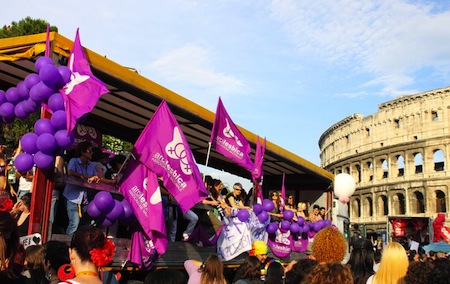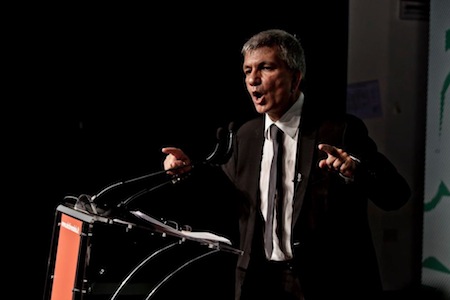Last weekend, Nichi Vendola, the openly gay regional president of Puglia, pluckily posted to Twitter a photo of himself campaigning alongside Pier Luigi Bersani, the leader of the center-left Partito Democratico (PD, Democratic Party), captioned ‘coppia di fatto‘ (‘de facto couple’).
![]()
Vendola, the leader of the more stridently leftist Sinistra Ecologia Libertà (SEL, Left Ecology Freedom), is part of the broad centrosinistra (center-left) coalition that hopes to elect Bersani as Italy’s next prime minister this weekend, and the pun subtly reinforced the role that gay rights has played in Italy’s election campaign.
The subtlety speaks a lot to how the issue of gay rights and same-sex marriage has hummed along the surface of a campaign that’s been almost entirely fought over economic policy — he state of Italy’s finances, economic reforms, budget austerity and the encroaching control of Brussels and Berlin on Italian governance. Nonetheless, the gay rights issue is probably the most important social issue as the election approaches.
Given that Rome, Italy’s capital, is also home to the Vatican, gay rights is also one of the most polarizing issues of Italian public life.
Vendola (pictured above) is perhaps the most vigorous advocate of gay rights and same-sex marriage in Italy, but the progress elsewhere in Europe has also underscored Italy’s lack of progress on gay rights.
With parliaments in two of Europe’s four most-populous countries — the United Kingdom and France — passing legislation that allows for same-sex marriage in the past month, there’s some pressure on Italy to follow suit. Italy also lacks any anti-discrimination laws or hate crime laws designed to prevent crimes with a particularly anti-gay bias. Although southern Europe isn’t traditionally as socially liberal as northern Europe, both Spain and Portugal have promulgated full same-same marriage rights — Spain did so eight years ago.
The Roman Catholic church still refuses to accept homosexuality as a socially and morally acceptable choice, to say nothing of gay marriage and gay adoption. Church teaching and politics have long gone hand-in-hand in Italy, with the former Christian Democratic party taking socially conservative stands throughout the last half of the 20th century, first on divorce, then on contraception, abortion and gay rights. Former center-left prime minister Romano Prodi’s government was brought down in part in 2008 due to his backing of a bill that would have granted marriage-like rights to same-sex couples.
At the same time, polls show an increasing number of Italians support the rights of same-sex couples to have the same rights as opposite-sex couples. In October 2012, a more moderate leftist, Rosario Crocetta, became regional president of Sicily (of all places), joining Vendola as Italy’s second openly gay regional president.
Vendola took Italy by storm in 2005 when, as a full-fledged communist, defeated the center-right incumbent Raffaele Fitto. You can’t forget that Vendola’s success didn’t come in Emilia-Romagna or Tuscany, the leftist heartlands of Italy, but in Puglia, a conservative, southern Italian province that, physically and culturally, is closer to Greece in many ways than to the rest of Italy, and one of Italy’s least wealthy regions. He won reelection by an easy margin in 2009.
As regional president, Vendola has used government coffers to pursue countercyclical economic policy to shield residents from the harshest aspects of the Italian recession and his region has posted some of the best job growth in the country. As regional president, he’s also used government funds to boost young artists, as well as create incentives for producing renewable energy. Although he came in a far third in the primary to determine the centrosinistra‘s prime ministerial candidate, he’s campaigned vigorously for Bersani. In turn, Bersani has endorsed same-sex unions, though not same-sex adoptions.
Italy is an odd example of a country where same-sex marriage is less controversial than same-sex adoption — that’s entirely opposite of attitudes in, say, the United States, where gay couples have been increasingly adopting children for some time (if not always with ease) and where the showcase of functional and happy gay families has been one of the major rationales for enacting same-sex marriage rights.
There are a lot of complicated reasons why that’s the case. Without putting on my cultural anthropology hat for too long, I’ve always thought that it has to do with the centrality of the mother in Italian life — many Italians I’ve talked to, even gay Italians, simply cannot wrap their minds around how a bambino could grow up without a mamma.
In any event, the traditional alliances are shifting.
Silvio Berlusconi, the former prime minister and leader of the Popolo della Libertà (PdL, People of Freedom), is leading the centrodestra (center-right) coalition into this weekend’s election, and made global headlines when he came out in favor for same-sex civil unions in January. That’s quite a turnaround for Berlusconi, who as recently as 2011, promised to defend Italy against same-sex marriage and adoption. He famously defended himself against sex sleaze charges by saying it was “better to like beautiful girls than be gay.”
Given that the Vatican has shifted support from Berlusconi’s coalition to prime minister Mario Monti, however, and given that Berlusconi, who’s on trial for having solicited under-aged Moroccan prostitutes, among other peccadilloes, has long ceased to be a paragon of traditional family values himself, that may well be a smart political move.
It’s hard to imagine, however, that Berlusconi would lead the charge for same-sex rights over the next five years — or even necessarily join forces with Bersani to enact legislation.
Ironically, however, as the race has tightened, there’s a chance that Bersani will need the support of Monti’s small, centrist coalition to form a government. Monti, who does not support same-sex marriage, has joined forces with the most pro-Vatican party in Italy, the Unione di Centro (UdC, Union of the Centre), a group of former Christian Democrats close to the Vatican and led by Pier Ferdinando Casini, who earlier this month compared same-sex marriage to pedophilia:
Speaking on national radio, Casini said: ‘On gay marriage we can not follow Europe. Some northern countries have given voice to movements campaigning for pedophilia.
‘I have a lot of gay friends and I know that they need some rights. But we can not allow same-sex marriage, this sacred moment is possible only between a man and a woman.’
So Bersani, on the cusp of a historic victory for Italy’s left, may well need the support (in the upper house of Italy’s parliament, at least) of some of Italy’s most anti-gay politicians.
If that happens, Vendola may withdraw his support from Bersani’s coalition. Vendola’s already none too thrilled about Monti’s push to cut Italy’s budget and Bersani’s plans to pursue an austerity-minded economic policy. But the wide divide on same-sex marriage gay rights has created a deeper animus between Vendola and Monti that promises to exacerbate the existing tensions that Bersani will face in trying to manage a very broad center-left government.
So what does this mean for same-sex marriage? If Bersani’s coalition wins outright — including with a majority in Italy’s upper house, the chances are great that Italy will at least feature same-sex unions for the first time in its history. If Bersani needs Monti’s coalition for support, however, the issue seems likely to fall well down the priority list, despite Vendola’s best efforts.
Photo credit to alessandro0770 / 123RF Stock Photo — Europride 2011, Rome.

